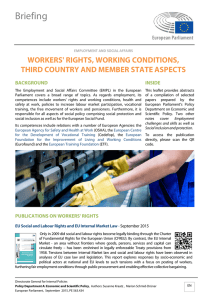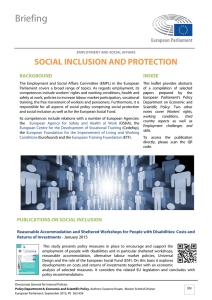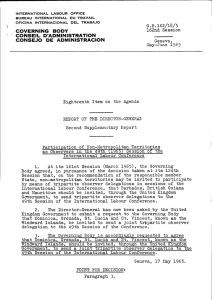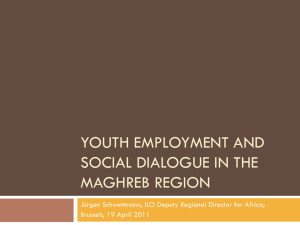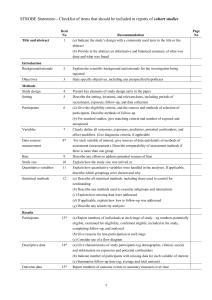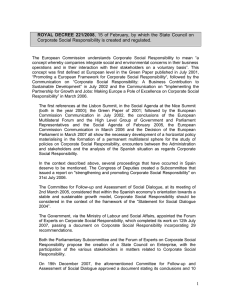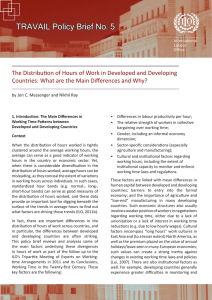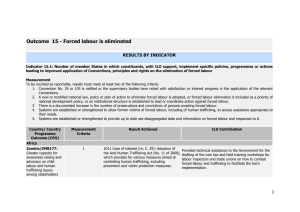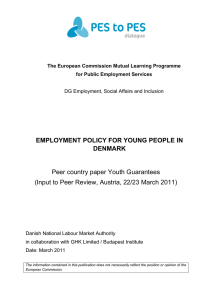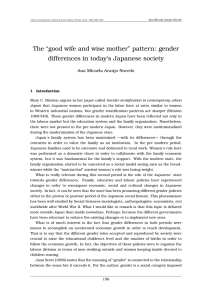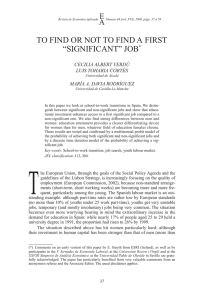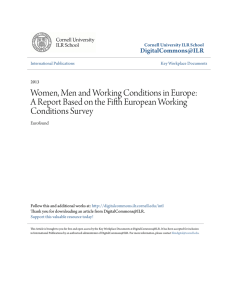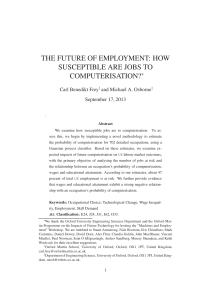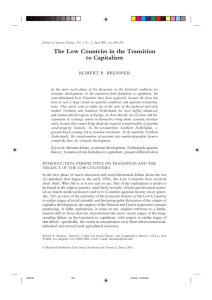employment challenges and skills - European Parliament
Anuncio
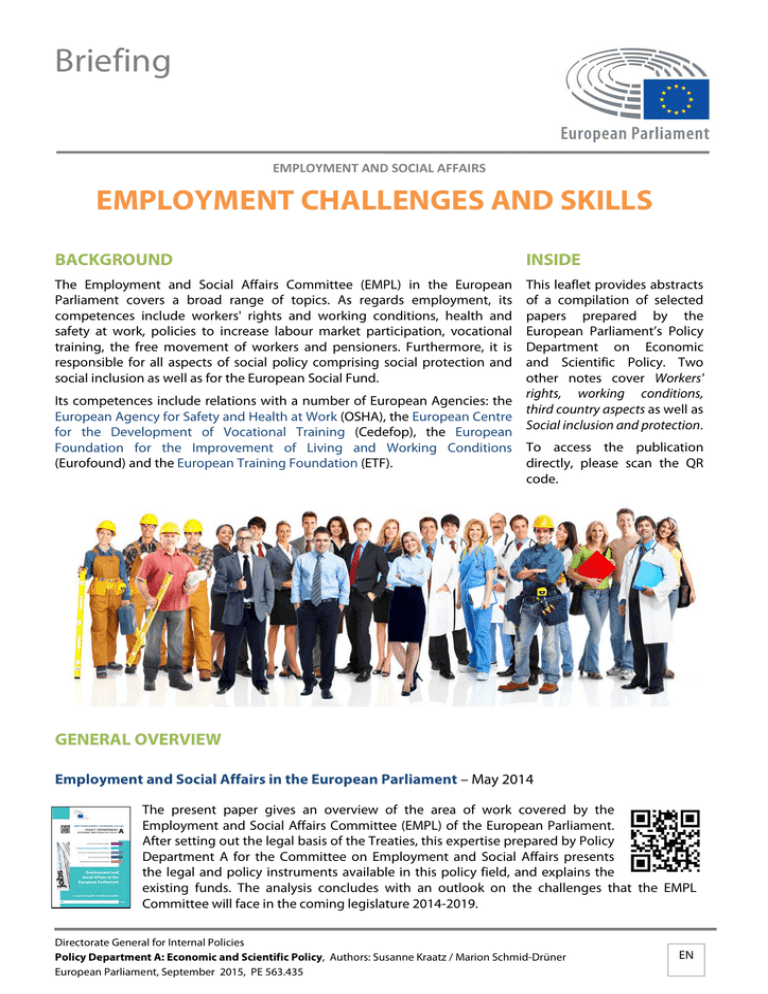
Briefing EMPLOYMENT AND SOCIAL AFFAIRS EMPLOYMENT CHALLENGES AND SKILLS BACKGROUND INSIDE The Employment and Social Affairs Committee (EMPL) in the European Parliament covers a broad range of topics. As regards employment, its competences include workers' rights and working conditions, health and safety at work, policies to increase labour market participation, vocational training, the free movement of workers and pensioners. Furthermore, it is responsible for all aspects of social policy comprising social protection and social inclusion as well as for the European Social Fund. This leaflet provides abstracts of a compilation of selected papers prepared by the European Parliament’s Policy Department on Economic and Scientific Policy. Two other notes cover Workers' rights, working conditions, Its competences include relations with a number of European Agencies: the third country aspects as well as European Agency for Safety and Health at Work (OSHA), the European Centre Social inclusion and protection. for the Development of Vocational Training (Cedefop), the European Foundation for the Improvement of Living and Working Conditions To access the publication directly, please scan the QR (Eurofound) and the European Training Foundation (ETF). code. GENERAL OVERVIEW Employment and Social Affairs in the European Parliament – May 2014 The present paper gives an overview of the area of work covered by the Employment and Social Affairs Committee (EMPL) of the European Parliament. After setting out the legal basis of the Treaties, this expertise prepared by Policy Department A for the Committee on Employment and Social Affairs presents the legal and policy instruments available in this policy field, and explains the existing funds. The analysis concludes with an outlook on the challenges that the EMPL Committee will face in the coming legislature 2014-2019. Directorate General for Internal Policies Policy Department A: Economic and Scientific Policy, Authors: Susanne Kraatz / Marion Schmid-Drüner European Parliament, September 2015, PE 563.435 EN Policy Department A: Economy and Scientific Policy Collection of Key studies PUBLICATIONS ON EMPLOYMENT CHALLENGES - DEMOGRAPHIC CHANGE Combining the Entry of Young People in the Labour Market with the Retention of Older Workers – April 2013 An analysis of the employment situation of young and old workers in the EU Member States and of policies to promote the employment of both groups shows that there is no competition between young and older workers on the labour market. Structural or general policies to enhance the functioning of EU labour markets are crucial to improving the situation of both groups. Initiatives taken at the EU level can provide added value, particularly through stimulating the exchange of experiences and facilitating regional and intra-European cross-border mobility. PUBLICATIONS ON EMPLOYMENT CHALLENGES - IMPACT OF THE CRISIS Youth Unemployment in Greece: Situation before the Government Change - June 2015 The briefing note analyses the development of youth unemployment and of NEET youth (Neither in Employment, Education, Training) in Greece in a comparative perspective (Cyprus, Ireland, Portugal, Spain). It describes its specific features and gives an overview of national and European policy initiatives with a view to the implementation of the Youth Guarantee. Austerity and Poverty in the European Union – August 2014 This study analyses the speed and composition of fiscal consolidation strategies. It describes major social developments in Europe, with a focus on poverty, and considers and interprets the links between fiscal consolidation measures and social developments. The Social and Employment Situation in Ireland - February 2013 The note sets out how the Irish government responded to the financial crisis. In this context, the key measures to combat poverty and social exclusion are presented. The Impact of the Financial Crisis on the Job Creation Potential of SMEs – September 2012 Small and medium-sized enterprises (SMEs) are the backbone of the European economy. This study reviews the effect of the current crisis on Europe’s economy, as well as measures taken by governments and social partners to support SMEs in the crisis. The study discusses in detail the experience and potential of two main types of measures (short-time working arrangements and skills development and training) for a number of Member States. Most of them have implemented measures in the form of packages rather than stand-alone individual measures. The study reviews recent experiences with such packages in Austria and Lithuania and ends with conclusions and recommendations. EMPLOYMENT CHALLENGES AND SKILLS September 2015 Collection of Key studies Policy Department A: Economy and Scientific Policy SKILLS DEVELOPMENT FOR THE LABOUR MARKET The Availability and Use of Assistance for Entrepreneurship to Young People - April 2015 The study gives an up-to-date picture of developments as regards the availability and use of support programmes and schemes to promote or facilitate youth entrepreneurship across the EU. It presents a description of existing policy approaches to youth entrepreneurship support and an analysis of their strengths and weaknesses through a selection of policy examples from eleven Member States. Encouraging STEM Studies for the Labour Market - March 2015 There is evidence of skills shortages in STEM fields in spite of high unemployment rates in many Member States. This study provides an up-todate overview of the labour market situation in STEM occupations. It analyses European and national approaches to encourage STEM uptake in relation to these labour market needs. The aim is to identify practices which help to increase the supply of STEM skilled labour. Proceedings of the Workshop on the Impact of the Crisis on Skills Shortages - July 2015 The document contains a summary of discussions, background papers and the presentations of that workshop. Contributors from different research institutions present and discuss results from various studies covering aspects, such as the role of labour market intelligence to shape training for unemployed and to facilitate transitions of young people into the labour market. Labour Market Shortages in the EU - March 2015 The study gives an overview of labour shortages, looking at their types and causes, their occurrence within the EU-28 and possible measures to counter them. It finds that there are no overall quantitative shortages at EU-28 level in the wake of the economic crisis, but qualitative shortages, especially relating to skills shortages and mismatch, occur in several regions, sectors, occupations and Member States. Employers and Member States are the prime actors to counter labour shortages effectively, but the EU can play an important supporting role through its influence on intra-EU mobility, by increasing the transparency of the labour market and by using its structural funds as supportive frameworks. Youth Unemployment and the Skills Mismatch in Denmark - March 2015 The paper analyses the labour market situation in Denmark with a focus on youth unemployment and related policy measures. It furthermore presents data on future skills mismatch and the various Danish reforms to tackle the challenge of a rising demand for highly skilled workers. Finally it discusses some policy lessons that can be drawn from the Danish experience. EMPLOYMENT CHALLENGES AND SKILLS September 2015 Policy Department A: Economy and Scientific Policy Collection of Key studies Reform of Educational Systems: European Policies for Lifelong Guidance to Fight Early School Leaving and Unemployment - February 2015 After a summary of dedicated concepts and evidence from research, the briefing analyses guidance related aspects in key policy documents of the Council and the European Parliament. The paper describes European lifelong guidance policies and structured European cooperation including findings from a recent survey. The link between Job Creation, Innovation, Education and Training: An assessment of Policies pursued at EU Level - May 2010 The study analyses how EU cooperation strategies in the realms of employment, innovation and education and training interact in shaping labour market dynamics and influence the quantity and quality of new jobs. It attempts to give an assessment of whether the current policies pursued at the EU level are appropriate to reach the objectives of creating higher growth and more and better jobs. UPCOMING PUBLICATIONS Information and consultation of public sector workers - At a glance How to mainstream the social scoreboard into macroeconomic surveillance - Study Employment and social situation in Greece, Portugal, the Netherlands - In-depth analyses POLICY DEPARTMENTS MONTHLY HIGHLIGHTS The five policy departments are responsible for providing - both in-house and external - high-level independent expertise, analysis and policy advice at the request of committees and other parliamentary bodies. They are closely involved in the work of committees which they support in shaping legislation on and exercising democratic scrutiny over EU policies. Policy departments deliver policy analysis in a wide variety of formats, ranging from studies and in-depth analyses to briefings and the Fact Sheets on the EU. The Monthly highlights provide an overview of the on-going work of the policy departments. To receive this publication send an email to: CONTACTS Access all publications produced by the Policy Departments. Policy Department A - Economic and Scientific Policy ECON - ENVI - EMPL - IMCO - ITRE - TAXE [email protected] [email protected] SUPPORTING ANALYSES All publications: www.europarl.europa.eu/supporting-analyses Disclaimer The content of this document is the sole responsibility of the author and any opinions expressed therein do not necessarily represent the official position of the European Parliament. It is addressed to the Members and staff of the EP for their parliamentary work. Reproduction and translation for non-commercial purposes are authorised, provided the source is acknowledged and the European Parliament is given prior notice and sent a copy. ISBN: 978-92-823-7928-8 (paper) ISBN: 978-92-823-7927-1 (pdf) Catalogue: QA-04-15-597-EN-C; QA-04-15-597-EN-N doi: 10.2861/635161 (paper) doi: 10.2861/435578 (pdf) © European Union, 2015

